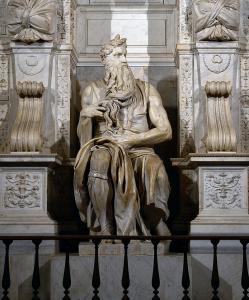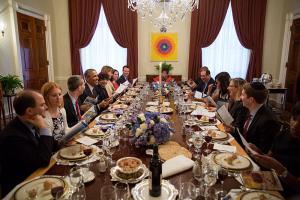 It seems quite astonishing that in what the Common Lectionary names a “semicontinuous” romp through the entire book of Exodus that they would offer precisely no texts from the long tale of Moses’s awe-filled and justly famous confrontation with pharaoh by means of the ten plagues against Egypt, culminating in the death of the Egyptian first born. This iconic story covers fully 8 chapters of text where we witness Moses’ unyielding demands for freedom for Israel matched by the equally unyielding certainty of pharaoh that those slaves will never leave the Black Land. I wonder why we are not allowed (or forced?) to deal with that troubling notion of the “hardening of pharaoh’s heart?” Whenever pharaoh seems about ready to give in to the demands of Moses, “God hardens his heart” so that he will not let them go. In reality, the text is more complex than that, suggesting at two places that “pharaoh hardens his own heart” and at other spots that “his heart was hardened,” not referring to God in any direct way. I have long wondered whether this variation in ascription to the source of pharaoh’s reluctance to accede to Moses’s demands is not the ancient author’s way of struggling with the difficult idea that God appears in fact to be playing with the Egyptian monarch in rather arbitrary ways, and offers other rationales for pharaoh’s behavior, thus in part letting God off the hook. The lectionary’s collectors seem uninterested in this huge theological problem, at least in their choices for this round of the texts, but I would suggest that you, the preacher/teacher, might want to take this issue on in sermon or lesson.
It seems quite astonishing that in what the Common Lectionary names a “semicontinuous” romp through the entire book of Exodus that they would offer precisely no texts from the long tale of Moses’s awe-filled and justly famous confrontation with pharaoh by means of the ten plagues against Egypt, culminating in the death of the Egyptian first born. This iconic story covers fully 8 chapters of text where we witness Moses’ unyielding demands for freedom for Israel matched by the equally unyielding certainty of pharaoh that those slaves will never leave the Black Land. I wonder why we are not allowed (or forced?) to deal with that troubling notion of the “hardening of pharaoh’s heart?” Whenever pharaoh seems about ready to give in to the demands of Moses, “God hardens his heart” so that he will not let them go. In reality, the text is more complex than that, suggesting at two places that “pharaoh hardens his own heart” and at other spots that “his heart was hardened,” not referring to God in any direct way. I have long wondered whether this variation in ascription to the source of pharaoh’s reluctance to accede to Moses’s demands is not the ancient author’s way of struggling with the difficult idea that God appears in fact to be playing with the Egyptian monarch in rather arbitrary ways, and offers other rationales for pharaoh’s behavior, thus in part letting God off the hook. The lectionary’s collectors seem uninterested in this huge theological problem, at least in their choices for this round of the texts, but I would suggest that you, the preacher/teacher, might want to take this issue on in sermon or lesson.
But today we are given the origin story about the central festival of Israel’s life from then until now, the celebration of the Passover. The grand drama of Moses vs. pharaoh has been building throughout the unleashing of the plagues, and Ex.10:21-29 has described the 9th plague, that one of a terrifying darkness, a three-day complete extinguishing of all light for Egyptians, while the Israelites still had light (Ex.10:23). Pharaoh, peering through the absolute and dense darkness, tells Moses that he may go worship his God, but he must leave “all flocks and herds behind.” Not possible, replies Moses; if we are to sacrifice to our God, we must have livestock. So after another God- hardening (Ex.10:27), pharaoh shouts that Moses must leave him forever; and if he ever returns to see his face, he will die.
And with that, Ex.11:1-10 warns of the worst and final plague, the death of every single first born Egyptian creature in all the land of Egypt, human and animal. As the reader moves toward Ex.12, we fully expect this terrible warning to be fulfilled. Yet, quite surprisingly we do not read of Egyptian death, but rather of a celebration of what will be known as Passover. From Ex.12:1-28, we are given the details of a proper feast that commemorates the great victory of God over pharaoh, how that God passed over the houses of God’s people, Israel, and struck the houses of Egypt with death. Such an intrusion in the building drama of the plagues breaks every law of literary art; the very last thing any author ought do is to stanch the arc of the tale, to stop the increasing anxiety of the plague story by inserting such a seemingly bland and unsuspected account of festival. Ex.12:29 returns to the monstrous night of death for Egypt, the final blow that will allow the freedom of God’s people, but the drama has been stopped cold before it reaches its horrifying denoument.
Why? Why did the collector of the complex book of Exodus feel the need to include at this particular point the recitation of and the demand for the Passover feast? Obviously, this ancient editor, perhaps collecting the book long after the dramatic tales have been well-known and told for centuries, felt a need to warn the Israelites, perhaps now the Judeans in Babylonian exile, that unless they celebrate the great story, they will forget it; unless they share festival together, they may not remember just why they are still a community together, now in a foreign land. Without the celebration, the danger is to water down the story so much as to make it meaningless, to render it useless in ever changing circumstances. The feast with its careful delineation of an unblemished lamb, shared among households if one house is too small to have a lamb of its own (Ex.12:4), its proper slaughter on the 14th day of the first month of the year, and the spreading of blood on the doorposts of every house to protect that house from the mysterious “destroyer” of God, is to be celebrated with precision and diligence “throughout your generations as a perpetual ordinance” (Ex.12:14).
Repeated celebrations in community are crucial for the ongoing life and vitality of that community. As peculiar as this intrusive chapter in the very heart of the drama of the exodus victory may seem, in this time of COVID-19, a virus enshrouding and debilitating the entire world, this call for festival appears all the more important. Reading the great story from our Bibles alone may have a certain value, but reciting the tale, even in virtual community, reflecting on its meaning in sermon and classroom, and then joining electronically in common celebration is to me more crucial than ever in this strange world we now live in. My church, as many of yours I imagine, has held virtual worship services for some 5 months. Each Sunday, our pastoral staff has recorded from our lovely sanctuary music, prayers, and sermons, has uploaded all of them to a stream that may be accessed on Sunday at 10:00AM, our regular worship time, or at any other time during the week. On Sundays, we have from 70-90 contacts for the service and at others times some more, from other states, and even in one or two instances, other countries. All of this great effort is our attempt to celebrate the great tales of the faith. Without these communal celebrations, separated as we are by the virus, the story on which the celebration is based, could easily wither and die.
I think the ancient editor of Exodus had already experienced the huge importance of celebrating the central story of the faith of Israel together in community, however those celebrations may have been enacted. Public worship may have been difficult and sporadic in exile, so the home may have become a prime locus for the feast, just as it has become for Jews in the 21st century. Is it possible that we Christians might learn from our Jewish brothers and sisters the inestimable value of regular worship experiences among our families in our homes? And in the time of COVID, the family may take on even more crucial significance as the place of regular festival. Hence, Ex.12:1-28 is not so out of place as it may at first appear, for it commends both the great story along with its regular celebration to us as living witnesses to the vast power of God to win victory for the people, even when the odds are stacked hugely against them. This is the very God we need now, facing deep racial divisions, a hotly contested presidential election, the shattered economy, and the dense cloud of the virus. Those modern day pharaohs may be defeated, and we should always be anxious to celebrate that defeat together, whether in person or on-line.
(Images from Wikimedia Commons)











